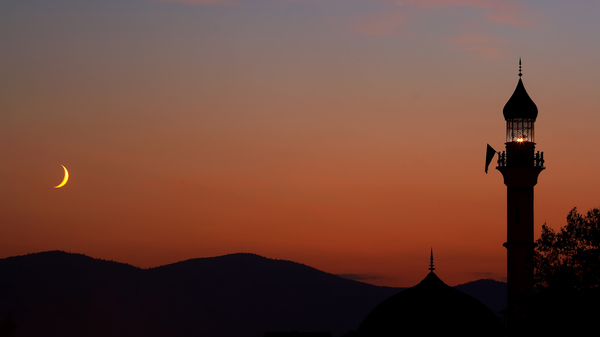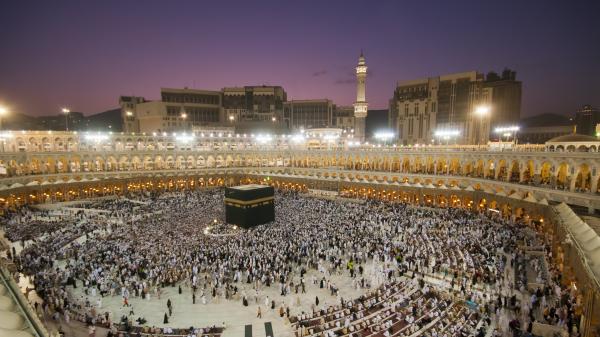Moon Sighting: Finding the Ramadan Date
The Ramadan start date is different every year. Muslims wait to see the crescent Moon before they start their most important month—a sacred tradition that comes with complications.

The Islamic month of Ramadan starts when the new crescent Moon has been sighted
© iStockphoto.com/damircudic
Ramadan 2026 starts on February 18, 2026
For reasons explained in this article, the date is tentative and may vary between countries.
Ramadan Changes Every Year
Ramadan is the ninth month in the Islamic calendar. During Ramadan, Muslims around the world fast for 29 or 30 days. Because the Islamic calendar is based on the Moon while the Gregorian calendar is based on the Sun, the Ramadan date “wanders” through the year.
Ramadan Starts with Moon Sighting
The Islamic calendar uses the phases of the Moon to mark the months’ start and end dates. When the Moon disappears from the night sky during the New Moon phase, an Islamic month is about to end. As soon as the Moon reappears, the new month starts.
Ramadan is not like any other month: the question of when Ramadan begins and how Muslims should determine the start of their fasting is answered in the holy scriptures, for example inHadith No. 2378 from Sahih Muslim Book 6:
Abu Huraira reported Allah's Messenger (may peace be upon him) as saying: Whenever you sight the new Moon (of the month of Ramadan) observe fast. And when you sight it (the new Moon of Shawwal) break it, and if the sky is cloudy for you, then observe fast for thirty days.
"Sahih Muslim Book 6"
Hadith No. 2378Problems with Moon Sighting
The rule to finding the Ramadan start date seems simple enough: Ramadan starts as soon as the first sliver of the growing Moon after the month of Sha‘bān can be sighted in the night sky. However, there are some challenges and questions that have arisen in the Muslim world:
Sighting with the Naked Eye?
Some Muslim scholars argue that only the naked eye should be used to spot the Moon since no instruments were mentioned in the Quran. Others argue that optical aids are a natural extension of the human eye and therefore allowed. Saudi Arabia, a country many Muslims look to for guidance,allows telescopes for Moon sightings.
What about Bad Weather?
The new Crescent Moon might be hard to see even with optical aids—clouds and bad weather can hide it. Should Muslims wait until the sky clears? Many Muslim countries still follow this rule causing delays between Ramadan datesaround the world. South Africa, for example, moved the end of Ramadan (Eid ul-Fitr) in 2022 because the Moon could not be spotted due to cloudy skies.
The only way around this is to either follow a different sighting—many Muslims choose to follow Saudi Arabia—or to rely on calculations until the Moon can be seen again, which is highly controversial.
Who Is Sighting the Moon?
Does every single Muslim have to see the Moon or is it enough if one Muslim sees the Moon, and all others follow them? The “one horizon rule” is a school of thought treating the whole world as one: As soon as the crescent Moon has been sighted anywhere in the world, all Muslims should start fasting.
The other side argues that every region or time zone should have its own Moon sighting. This is the “local horizon rule.” This school of thought argues that although it would be good to unite all Muslims all over the world, they all pray at different times already, and one or two days of difference are acceptable.

Can you spot the Moon? You might think so, but this bright disk is actually Venus. The Moon is not visible in this picture.
© iStockphoto.com/shaunl
What If It Isn’t the Moon?
How can it be guaranteed that a person who claims to have seen the Moon is trustworthy and does not make mistakes? This challenge has led to false Ramadan start dates in the past: someone had spotted Venus in the night sky and mistaken it for the Moon.
Sighting or Calculating the Moon?
In Islam, the idea of calculating dates instead of sighting the Moon has been shunned for a long time. In the last years however, the idea has been gaining popularity: In 2006, the Fiqh Council of North America, one of the most influential Muslim organizations in the US, started to calculate the date of Ramadan. In 2008, the European Council of Fatwa and Research recommended the use of calculation as well.
The main argument used by proponents of calculations is this: In an ideal world, sighting the Moon with the naked eye would be enough. In our world, however, astronomical calculations are reliable while sighting is unreliable; thus it is better for Muslims to focus on worshiping Allah than to focus on the Moon. This position is still fiercely debated.
Mecca in Saudi Arabia is the central holy site for all Muslims around the world. ©iStockphoto.com/afby71
No Central Authority to Enforce Rules
Islam is not centrally organized. Muslims organize themselves locally in communities and mosques, as well as nationally in the case of Islamic countries. This structure does not allow a single worldwide authority (other than the Quran). Questions that divide Muslims, like the Moon sighting rules, usually lead to different answersaround the world.
Although there is no single leader of Muslims, there are countries like Turkey and Saudi Arabia that influence Muslims around the world. Saudi Arabia is the home of Mecca, the holiest site of Islam; this is one of the reasons why many Muslim communities choose to follow Saudi Arabia when it comes to prayer times, holiday dates, and Moon sighting rules.
Ramadan Start in Saudi Arabia
Saudi Arabia uses their own Muslim calendar called Umm al-Qura. This calendar calculates dates like Ramadan for non-religious use—it is meant to make everyday life easier to plan, not to serve as a guide for religious practice.
When it comes to the religious date of Ramadan, Saudi Arabia relies on Moon sightings. Optical aids are allowed but not mandatory. Every Muslim in Saudi Arabia can report a Moon sighting to the authorities. Additionally, there are several Moon-sighting committees consisting of Islamic scholars, astronomers, and volunteers.
The Supreme Court of Saudi Arabia decides which sighting is legitimate and issues the official starting date of Ramadan. This date is then reported by Islamic news sites and read by Muslims around the world.